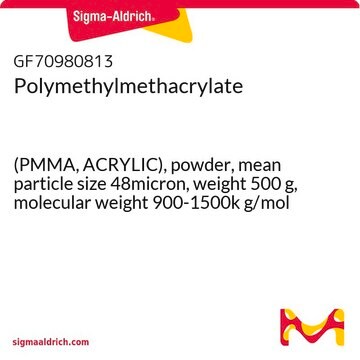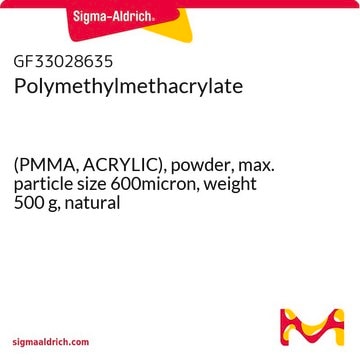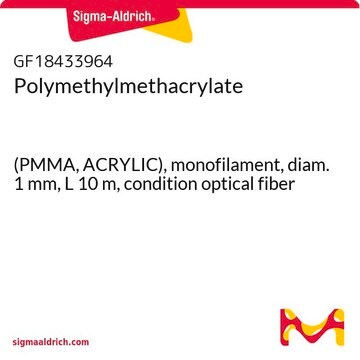182230
Poly(methyl methacrylate)
Synonym(s):
PMMA, Poly(methacrylic acid methyl ester)
About This Item
Recommended Products
autoignition temp.
580 °F
impurities
may contain ≤2.0% toluene
refractive index
n20/D 1.49
inherent viscosity
0.20 dL/g(lit.)
transition temp
Tg (DSC) 105 °C (midpoint)
solubility
H2O: insoluble
density
1.188 g/mL at 25 °C
InChI
1S/C5H9O2/c1-4(2)5(6)7-3/h1-3H3
InChI key
PMAMJWJDBDSDHV-UHFFFAOYSA-N
Looking for similar products? Visit Product Comparison Guide
General description
Application
Some studies report its use in
PMMA-titania hybrid optical thins films
PMMA/polystryrene/clay nanocomposites
PMMA/polyurethane/carbon black nanocomposites for methanol fuel cells
Storage Class Code
11 - Combustible Solids
WGK
WGK 2
Personal Protective Equipment
Certificates of Analysis (COA)
Search for Certificates of Analysis (COA) by entering the products Lot/Batch Number. Lot and Batch Numbers can be found on a product’s label following the words ‘Lot’ or ‘Batch’.
Already Own This Product?
Find documentation for the products that you have recently purchased in the Document Library.
Customers Also Viewed
Articles
The detection and quantification of biomarkers are essential for medical diagnostics, environmental monitoring, and bioresearch.
Electrospinning technique applications discussed, emphasizing control of nanofibers and assembly into 3D architectures.
Professor Aran discusses engineering graphene-based materials through careful functionalization, enabling diverse applications.
Self-healing soft electronic materials enable autonomous repair, reducing waste and costs in electronic devices.
Our team of scientists has experience in all areas of research including Life Science, Material Science, Chemical Synthesis, Chromatography, Analytical and many others.
Contact Technical Service






